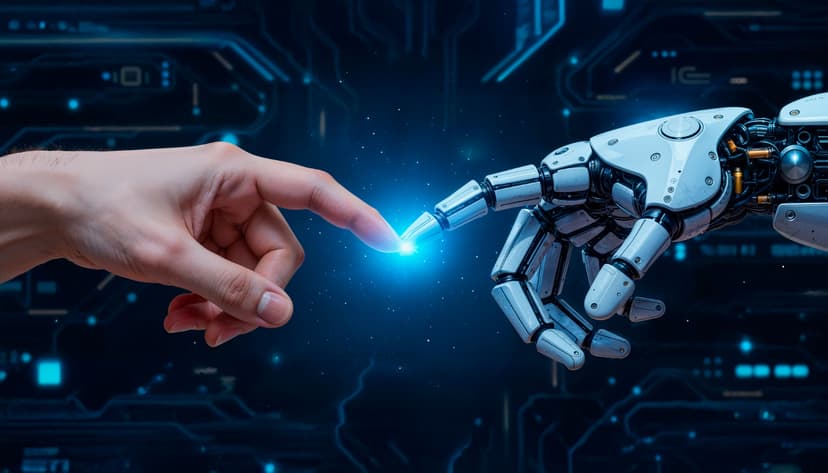


Are we ready for the next revolution in artificial intelligence?
In 2025, artificial intelligence will become an integral part of our daily lives. From smartphones to healthcare, from industry to education, AI developments are accelerating at an unprecedented pace, indicating that the future of technology has already begun. What are the most notable innovations? And how will AI impact our lives in the future?
Latest AI Developments in 2025
AI technologies are witnessing amazing developments, as algorithms are becoming capable of self-learning and analyzing big data quickly and accurately.
Among the most notable innovations are:
Generative AI:
Produces original content such as text, images, and videos using advanced models such as GPT and DALL-E.
Deep Learning:
Enables machines to handle complex tasks such as instant translation and early disease detection with high accuracy.
Intelligent Automation:
Integrating AI with robots to improve production efficiency in factories and organizations.
The Future of Technology: How Will Artificial Intelligence Change the World?
As AI continues to advance, several key areas are expected to undergo radical transformation:
Healthcare:
Smart diagnostic tools will save millions of lives by detecting diseases at their early stages.
Education:
Smart learning platforms will provide a personalized learning experience for each student, based on their needs and abilities.
Smart Cities:
The use of AI in energy management, transportation, and security will improve quality of life.
However, these opportunities face real challenges related to privacy, data security, and the ethics of AI use.
Conclusion: The future of technology begins today.
AI is no longer just a future trend; it is a present force reshaping every aspect of our lives.
Investing in understanding AI developments and embracing its responsible uses is essential to building a more prosperous and secure future.
Are you ready to join the era of AI?

The world today is undergoing an unprecedented transformation thanks to advances in artificial intelligence and machine learning.
From improving everyday services to driving massive innovations in various sectors, such as healthcare, education, and industry, artificial intelligence has become an essential tool for reshaping the way we interact with the world around us.
What is Artificial Intelligence?
AI is a branch of computer science that aims to create systems capable of mimicking human intelligence, such as reasoning, analysis, learning, and decision-making.
Its applications span a wide range of fields, from smart assistants like Siri and Alexa to the recommendation systems of Netflix and Amazon.
The most important characteristics of AI are:
The ability to learn from experience and data.
Logical analysis and data-driven decision-making.
Self-development without the need for constant human intervention.
What is Machine Learning?
Machine learning is a branch of artificial intelligence that focuses on developing systems capable of learning from data without the need for explicit programming for each task.
In other words, the system analyzes massive amounts of data, then discovers patterns and relationships that enable it to perform specific tasks better over time.
Types of Machine Learning:
Supervised Learning:
The model is trained on input data with correct answers.
Unsupervised Learning:
The model attempts to discover patterns and relationships in the data without guidance.
Reinforcement Learning:
The system learns through trial and error to achieve optimal results.
The Relationship Between Artificial Intelligence and Machine Learning
Machine learning is an important approach to artificial intelligence.
AI encompasses a wide range of goals and techniques, while machine learning is the tool that helps machines develop their own intelligence based on data.
Simply put: all forms of machine learning are part of artificial intelligence, but not all artificial intelligence is based solely on machine learning.
Applications of Artificial Intelligence and Machine Learning
These amazing technologies have numerous applications, including:
Healthcare: Early diagnosis of diseases through medical image analysis.
E-commerce: Improving user experience through intelligent recommendations. Financial sector: Fraud detection and credit risk analysis. Industrial sector: Predictive maintenance of production lines using performance data.
Future challenges.
Despite the tremendous opportunities available, AI and machine learning technologies face numerous challenges, most notably:
Privacy and data security issues.
Bias in algorithms and automated decisions.
Impact on the labor market and the replacement of some traditional jobs.
Therefore, this technological revolution requires the development of regulatory and ethical frameworks to ensure their responsible and sustainable use.
AI and machine learning are not just future technologies; they are a reality we live in today.
The more these fields advance, the more opportunities they offer to improve our daily lives, and the more important it is to use these technologies consciously and responsibly to achieve a better future for all.
AI is beginning to reshape our world, and the question now is: How do we prepare to seize this tremendous opportunity?